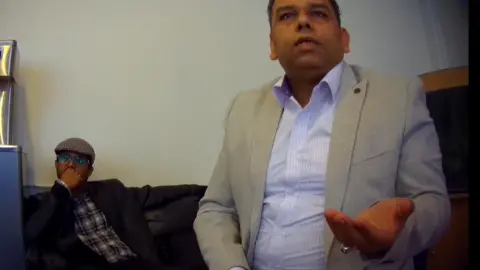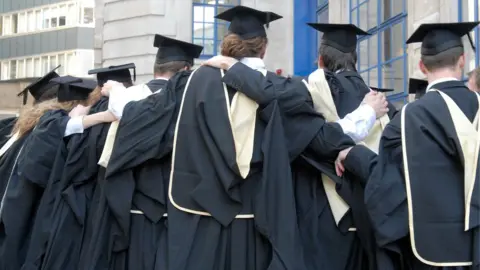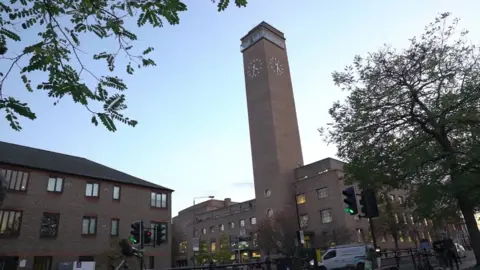Student loans fraud exposed by Panorama
 BBC
BBCThe chairwoman of Parliament's spending watchdog wants a police probe after the BBC's Panorama uncovered evidence of fraud in the student loan system.
One education agent was secretly filmed offering to get bogus students admitted into a government-approved private college for a £200 fee.
This was to allow the bogus students to fraudulently claim student loans.
Then for £1,500 a year, the agent offered to fake attendance records and to provide all their coursework.
Public Accounts Committee chairwoman Meg Hillier said: "There is criminal fraud going on from what you've shown me. It needs to be referred to the police."
'Horrible people exploiting education system'
BBC Panorama spent 10 months investigating dishonest education agents and bogus students who are committing frauds that target private colleges - also known as alternative providers - which offer courses approved for student loans.
Agents were secretly filmed supplying fake documents, including a qualification certificate to a BBC undercover researcher posing as a bogus student, who wanted to cheat their way on to courses and apply for student loans.
The National Union of Students has also called for an inquiry into the abuses exposed by Panorama.
"These are horrible people who are exploiting our education system," said NUS President Shakira Martin. "The student finance system is ultimately broken."
 NUS
NUSAbout £400m-a-year is received by 112 private colleges through the student loan system. The government is keen to expand the sector as part of reforms designed to make degree and diploma courses more accessible to people who might otherwise find it difficult to enter higher education.
Students on government-approved courses at private colleges in England, Wales and Northern Ireland are entitled to - depending on circumstances - £11,000 in maintenance loans to cover living expenses and up to £6,000 in tuition fee loans, paid direct to colleges.
This year total student loan debt, from universities and private colleges, topped £100bn.
'You just have to come and sit like a dummy'
Acting on a tip-off, Panorama approached Imran Saeed Sheikh, an agent and fraudster who owns a chain of barber shops in east London.
Mr Sheikh said that for a £200 fee he could get Panorama's undercover students on to a two-year Higher National Diploma (HND) business course, at Grafton College in central London, so they could get student loans.
He added that once a bogus student was admitted he could provide everything they would need to stay on their course, in return for an annual cut of their loan money. "When your first instalment comes we take £1,500," he said. "With this we take care of your attendance for the whole year, get your eight assignments done."
He added: "We have a relationship with the college. The money you give us with that, we'll make the system work inside."

One of the BBC's undercover students said they had left school at 16 and so lacked the necessary qualifications to meet entry criteria for the course. For £600, Imran and his assistant Raza Abbas Sheikh supplied them with a backdated certificate for a course they had not studied, which was equivalent to A-Levels.
The certificate apparently came from an awarding body based in the same building as Grafton College. Imran Sheikh claimed he got it from Asif Khawaja, Grafton's head of operations.
Like his other claim about inside help, the BBC does not know if he is telling the truth.
On the strength of the certificate, Panorama's undercover student was accepted on to the course, for which Grafton College charges £6,000 a year. Within days they received the first £3,600 instalment of their student loan money.
Imran Sheikh, who was at the college on the undercover student's induction day, told them they would barely need to attend their course.
"Come at around 10.00, take two hours off from your job, mark your attendance, tick mark your name, leave after two hours," he said.
"You just sit like a dummy and keep nodding along. When the college gives you assignments, you don't have to do them. These go directly to our agent in Pakistan. He gets people to do them."
Neither Imran Sheikh nor his assistant responded when approached by the BBC for comment.

Both the awarding body and Grafton College said they are unaware of any fraudulent activities. Asif Khawaja said he absolutely denies any involvement.
The course that the BBC's undercover student was enrolled on at Grafton College is set and validated by Pearson, one of the world's biggest education companies.
In a statement, Pearson said it takes all allegations of malpractice extremely seriously. It said that it had placed an immediate block on Grafton, which means that the college will not be able to register or certificate students for Pearson qualifications while an investigation is carried out.
The Open University, which has recently begun offering degree courses in partnership with Grafton, said it was seeking "urgent clarification" from the college. Any partnership found not to be meeting its expectations on standards and behaviour would be ended with immediate effect it added.

Analysis by education editor Branwen Jeffreys
What is a degree from a UK university worth?
If you're a student borrowing tuition fees and living costs, it's meant to be the proof of your hard work to take to employers.
If it's possible to buy a dodgy qualification to get on to a course, or pay someone else to do the work, the minimum value of a British degree is at risk.
BBC Panorama's investigation comes at a time of massive change. The government is looking at whether new businesses could offer degrees from day one on a probationary basis, which could attract interest from companies operating elsewhere in the world.
The prize, insist ministers, is the chance of fresh thinking, more short degree courses, better value for money. The jeopardy is the risk of abuse of a taxpayer backed student finance system.

'It won't interfere with your work'
Panorama also filmed undercover inside one of the UK's largest alternative providers, the Greenwich School of Management - also known as GSM London - which has more than 4,000 students at its Greenwich campus.
Most GSM students are recruited by the college itself, the rest come from freelance recruiters.
An undercover student secretly filmed a series of meetings with one freelance, Charles Logan, who has a contract with GSM to recruit students. The BBC understands Mr Logan receives approximately £600 for every student he helps to enrol, which is 10% of the tuition fees paid to GSM.
After the undercover student was admitted on to a three-year honours course in business management, Mr Logan put him in touch with someone who he said could do his degree-level assignments for him.
The student subsequently bought two assignments for £526 and a third from another online company. He submitted them as his own work. The deception was not detected and the purchased assignments were awarded good marks by GSM.
Those results were ratified by Plymouth University which validates and awards degrees studied at GSM. The university told Panorama that GSM is responsible for student admissions and attendance.
It says it has "long-standing and robust academic regulations and processes to prevent academic dishonesty and ensure the quality of its degrees".

GSM told Panorama that it has suspended its contract with Mr Logan and brought in external experts to investigate. It said if the allegations against Mr Logan are true, his actions are "totally unacceptable".
Charles Logan's lawyer told the BBC that he "emphatically denies acting fraudulently, either for profit or to assist students in fraudulently claiming student finance."
The Department for Education said it takes allegations of fraud and malpractice extremely seriously and was grateful to Panorama for bringing these cases to its attention. "The use of fake qualifications or plagiarised assignments is absolutely unacceptable.
"It not only threatens to undermine the reputation of our world-class higher education sector, but also devalues the hard work of those who don't cheat," it added.
Ms Hillier said the private college sector had expanded rapidly and the government had not created a regulatory system that was fit for purpose.
"It's got to crack down on what's happened now, really investigate it," she said.
"But it also has got to have a system that stops these chancers piling in and making money from the taxpayer."
The Quality Assurance Agency said the Higher Education and Research Act, passed earlier this year, would create a powerful new regulator for higher education in England called the Office for Students.
It said: "QAA advised the Government on aspects of this Act and supported the inclusion of important new powers of search and entry for the Office for Students. The absence of these powers has made tackling fraud a challenge for all parties."
You can see more on this story on Panorama, Student Loan Scandal on BBC One at 7.30pm on Monday 13th November and afterwards on iPlayer.
